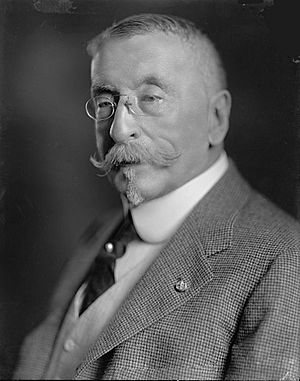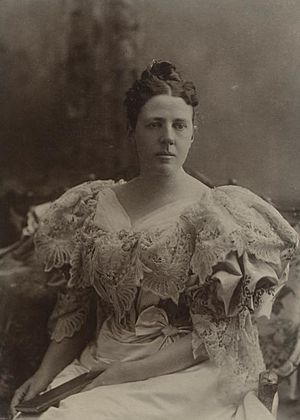Henry A. du Pont facts for kids
Quick facts for kids
Henry A. du Pont
|
|
|---|---|
 |
|
| United States Senator from Delaware |
|
| In office June 13, 1906 – March 3, 1917 |
|
| Preceded by | L. Heisler Ball |
| Succeeded by | Josiah O. Wolcott |
| Personal details | |
| Born |
Henry Algernon du Pont
July 30, 1838 Greenville, Delaware |
| Died | December 31, 1926 (aged 88) Greenville, Delaware, U.S. |
| Political party | Republican |
| Spouse | Mary Pauline Foster |
| Children | Henry Francis du Pont Louisa Evelina du Pont |
| Residences | Greenville, Delaware, U.S. |
| Alma mater | University of Pennsylvania United States Military Academy |
| Occupation | soldier, railroad executive |
| Awards | Medal of Honor |
| Military service | |
| Allegiance | |
| Branch/service | United States Army |
| Years of service | 1861–1875 |
| Rank | |
| Unit | 5th Regiment, U.S. Artillery |
| Battles/wars | American Civil War |
Henry Algernon du Pont (July 30, 1838 – December 31, 1926) was an important person from Delaware. He was a military officer, a successful businessman, and a politician. Henry du Pont was part of the famous Du Pont family.
He graduated at the top of his class from West Point in 1861. This was right after the American Civil War began. He served in the U.S. Army during the war. He even received the Medal of Honor for his brave actions. This award was for his role in the Battle of Cedar Creek in October 1864. After leaving the Army in 1875, he led the Wilmington and Northern Railroad Company for 20 years. He was also an active member of the Republican Party. He was elected as a U.S. Senator for Delaware. He served almost two full terms, from June 13, 1906, to March 4, 1917.
Contents
Early Life and Education
Henry du Pont was born on July 30, 1838. His birthplace was Eleutherian Mills, near Greenville, Delaware. His parents were Henry and Louisa Gerhard du Pont. His grandfather was Éleuthère Irénée du Pont, who started the famous E. I. du Pont de Nemours and Company. This company was the beginning of the du Pont family's history in the United States.
Henry du Pont studied at the University of Pennsylvania in Philadelphia. He then went to the United States Military Academy at West Point, New York. He finished first in his class there in 1861. This was just after the American Civil War started.
Military Career and Civil War Service
After graduating from West Point on May 6, 1861, du Pont became a 2nd Lieutenant of Engineers. Soon after, on May 14, 1861, he was promoted to 1st Lieutenant. He joined the 5th Regiment, U.S. Artillery. He served as an artillery officer in the Union Army during the Civil War. At first, he helped defend Washington and New York Harbor.
From July 1861 to March 1864, he worked as an administrative officer for his regiment. Then he was promoted to captain. Later, he became the chief of artillery for the Army of West Virginia. Du Pont was part of General Philip Sheridan's army. They fought in the Shenandoah Valley in northern Virginia. He earned the Medal of Honor for his actions at the Battle of Cedar Creek. His leadership during a difficult retreat helped Sheridan win the battle.
During the war, du Pont received two honorary promotions. He became a major on September 19, 1864. This was for his brave service in the battles of Opequon and Fisher's Hill. He was also promoted to lieutenant colonel on October 19, 1864. This was for his outstanding service at the Battle of Cedar Creek. After the war, du Pont continued his military career. He resigned from the Army on March 1, 1875.
Family Life and Home
Henry du Pont married Mary Pauline Foster in 1874 when he was 36 years old. They had two children: Henry Francis du Pont and Louise Evelina du Pont. The family lived on their large estate called Winterthur. This estate is located near Greenville, Delaware. The du Pont family were members of Christ Episcopal Church.
Business Ventures and Railroad Leadership
In 1875, Henry du Pont returned to Delaware full-time. Within a few years, he became the president and general manager of the Wilmington & Northern Railroad Company. He held this position from 1879 until 1899. During these years, and for the rest of his life, he also ran an experimental farm on his estate.
His son later turned the Winterthur estate into a museum in 1951. Today, it is known as the Winterthur Museum and Country Estate. It is a popular place to visit near Greenville, Delaware.
Political Career in the U.S. Senate
Henry du Pont was elected to the United States Senate on June 13, 1906. He filled a vacant seat that had started on March 4, 1905. During this time, he served with the Republican majority. He was part of the 59th, 60th, and 61st U.S. Congresses. In the 61st Congress, he led the Committee on Expenditures in the Military Affairs Department. This committee looked at how money was spent in the military.
He was elected to the U.S. Senate again in 1911. In this term, he was with the Republican majority in the 62nd Congress. However, his party was in the minority in the 63rd and 64th U.S. Congresses. In the 62nd Congress, he again chaired the Committee on Expenditures in the War Department. In the 63rd Congress, he was on the Committee on Military Affairs. For the 64th Congress, he was part of the Committee on Transportation and Sale of Meat Products.
In 1916, Delaware held its first popular election for a U.S. Senator. Henry du Pont ran for a third full term but lost. He was defeated by Democrat Josiah O. Wolcott, who was Delaware's Attorney General. Overall, Henry du Pont served most of two terms in the Senate. His time in office was from June 13, 1906, to March 4, 1917. He served during the presidencies of Theodore Roosevelt, William Howard Taft, and Woodrow Wilson.
Later Life and Legacy
Henry A. du Pont passed away at his home, Winterthur, on December 31, 1926. He is buried in the Du Pont de Nemours Cemetery in Greenville, Delaware. His son, Henry Francis du Pont, later transformed their home into the famous Winterthur Museum. Important historical documents and materials about Henry A. du Pont are kept in the archives at this museum.
Images for kids
 | Toni Morrison |
 | Barack Obama |
 | Martin Luther King Jr. |
 | Ralph Bunche |




